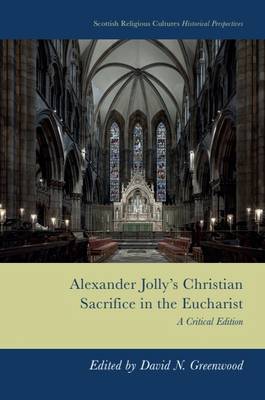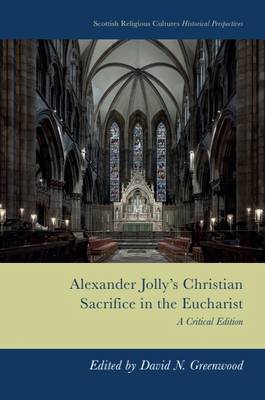
- Afhalen na 1 uur in een winkel met voorraad
- Gratis thuislevering in België vanaf € 30
- Ruim aanbod met 7 miljoen producten
- Afhalen na 1 uur in een winkel met voorraad
- Gratis thuislevering in België vanaf € 30
- Ruim aanbod met 7 miljoen producten
Zoeken
Alexander Jolly's Christian Sacrifice in the Eucharist
A Critical Edition
€ 133,45
+ 266 punten
Omschrijving
One of the great tragedies of the history of the church is that the Eucharist, intended to both symbolise and promote the unity of the church, has become a primary dividing point among Christians. Today, the Eucharistic prayer of invocation is assumed to involve transubstantiation, and is lauded or derided on the basis of that understanding. Few users of the American or Scottish Prayerbooks or their descendants realise that the Eucharistic theology of those that (re)introduced that liturgy with its invocation into the Anglican stream categorically rejected transubstantiation. In his 1831 work, The Christian Sacrifice in the Eucharist, Bishop Alexander Jolly promoted for a wide audience a view of the Eucharist that had flourished in Scotland for centuries. That Eucharistic doctrine has the potential to bridge the gap between major strands of Christianity.
Specificaties
Betrokkenen
- Uitgeverij:
Inhoud
- Aantal bladzijden:
- 216
- Taal:
- Engels
- Reeks:
Eigenschappen
- Productcode (EAN):
- 9781399552486
- Verschijningsdatum:
- 31/01/2026
- Uitvoering:
- Hardcover
- Formaat:
- Genaaid
- Afmetingen:
- 156 mm x 234 mm

Alleen bij Standaard Boekhandel
+ 266 punten op je klantenkaart van Standaard Boekhandel
Beoordelingen
We publiceren alleen reviews die voldoen aan de voorwaarden voor reviews. Bekijk onze voorwaarden voor reviews.







